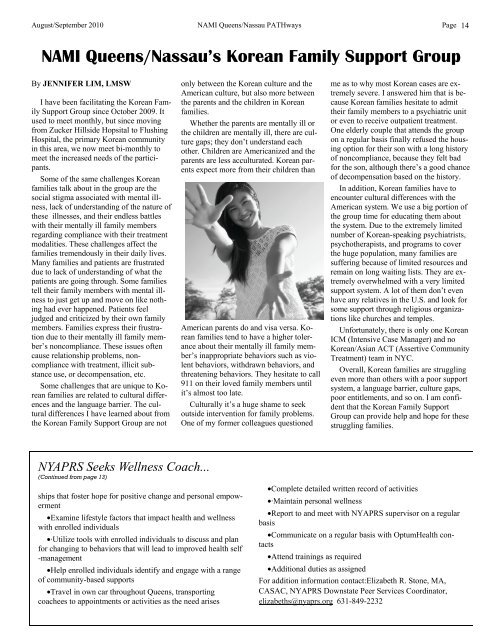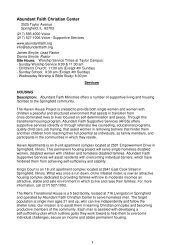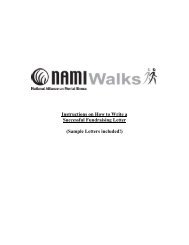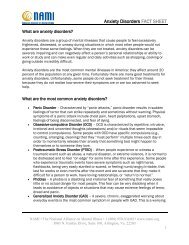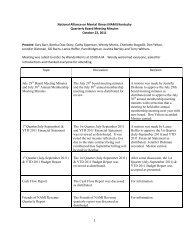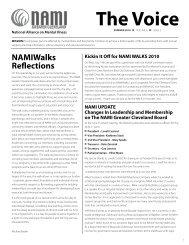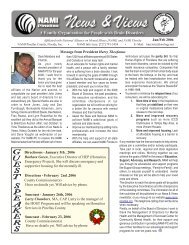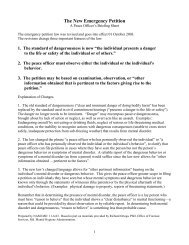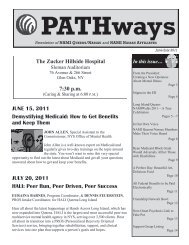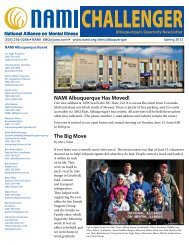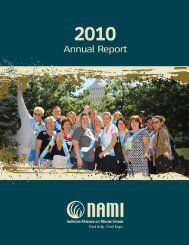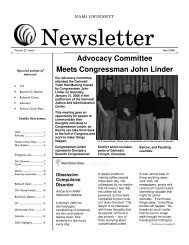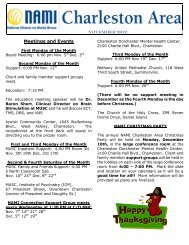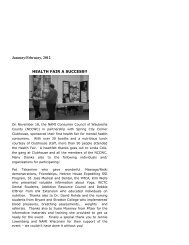PATHways Newsletter.pub - NAMI
PATHways Newsletter.pub - NAMI
PATHways Newsletter.pub - NAMI
You also want an ePaper? Increase the reach of your titles
YUMPU automatically turns print PDFs into web optimized ePapers that Google loves.
August/September 2010 <strong>NAMI</strong> Queens/Nassau <strong>PATHways</strong> Page 14<br />
<strong>NAMI</strong> Queens/Nassau’s Korean Family Support Group<br />
By JENNIFER LIM, LMSW<br />
I have been facilitating the Korean Family<br />
Support Group since October 2009. It<br />
used to meet monthly, but since moving<br />
from Zucker Hillside Hopsital to Flushing<br />
Hospital, the primary Korean community<br />
in this area, we now meet bi-monthly to<br />
meet the increased needs of the participants.<br />
Some of the same challenges Korean<br />
families talk about in the group are the<br />
social stigma associated with mental illness,<br />
lack of understanding of the nature of<br />
these illnesses, and their endless battles<br />
with their mentally ill family members<br />
regarding compliance with their treatment<br />
modalities. These challenges affect the<br />
families tremendously in their daily lives.<br />
Many families and patients are frustrated<br />
due to lack of understanding of what the<br />
patients are going through. Some families<br />
tell their family members with mental illness<br />
to just get up and move on like nothing<br />
had ever happened. Patients feel<br />
judged and criticized by their own family<br />
members. Families express their frustration<br />
due to their mentally ill family member’s<br />
noncompliance. These issues often<br />
cause relationship problems, noncompliance<br />
with treatment, illicit substance<br />
use, or decompensation, etc.<br />
Some challenges that are unique to Korean<br />
families are related to cultural differences<br />
and the language barrier. The cultural<br />
differences I have learned about from<br />
the Korean Family Support Group are not<br />
NYAPRS Seeks Wellness Coach...<br />
(Continued from page 13)<br />
ships that foster hope for positive change and personal empowerment<br />
•Examine lifestyle factors that impact health and wellness<br />
with enrolled individuals<br />
•·Utilize tools with enrolled individuals to discuss and plan<br />
for changing to behaviors that will lead to improved health self<br />
-management<br />
•Help enrolled individuals identify and engage with a range<br />
of community-based supports<br />
•Travel in own car throughout Queens, transporting<br />
coachees to appointments or activities as the need arises<br />
only between the Korean culture and the<br />
American culture, but also more between<br />
the parents and the children in Korean<br />
families.<br />
Whether the parents are mentally ill or<br />
the children are mentally ill, there are culture<br />
gaps; they don’t understand each<br />
other. Children are Americanized and the<br />
parents are less acculturated. Korean parents<br />
expect more from their children than<br />
American parents do and visa versa. Korean<br />
families tend to have a higher tolerance<br />
about their mentally ill family member’s<br />
inappropriate behaviors such as violent<br />
behaviors, withdrawn behaviors, and<br />
threatening behaviors. They hesitate to call<br />
911 on their loved family members until<br />
it’s almost too late.<br />
Culturally it’s a huge shame to seek<br />
outside intervention for family problems.<br />
One of my former colleagues questioned<br />
me as to why most Korean cases are extremely<br />
severe. I answered him that is because<br />
Korean families hesitate to admit<br />
their family members to a psychiatric unit<br />
or even to receive outpatient treatment.<br />
One elderly couple that attends the group<br />
on a regular basis finally refused the housing<br />
option for their son with a long history<br />
of noncompliance, because they felt bad<br />
for the son, although there’s a good chance<br />
of decompensation based on the history.<br />
In addition, Korean families have to<br />
encounter cultural differences with the<br />
American system. We use a big portion of<br />
the group time for educating them about<br />
the system. Due to the extremely limited<br />
number of Korean-speaking psychiatrists,<br />
psychotherapists, and programs to cover<br />
the huge population, many families are<br />
suffering because of limited resources and<br />
remain on long waiting lists. They are extremely<br />
overwhelmed with a very limited<br />
support system. A lot of them don’t even<br />
have any relatives in the U.S. and look for<br />
some support through religious organizations<br />
like churches and temples.<br />
Unfortunately, there is only one Korean<br />
ICM (Intensive Case Manager) and no<br />
Korean/Asian ACT (Assertive Community<br />
Treatment) team in NYC.<br />
Overall, Korean families are struggling<br />
even more than others with a poor support<br />
system, a language barrier, culture gaps,<br />
poor entitlements, and so on. I am confident<br />
that the Korean Family Support<br />
Group can provide help and hope for these<br />
struggling families.<br />
•Complete detailed written record of activities<br />
•·Maintain personal wellness<br />
•Report to and meet with NYAPRS supervisor on a regular<br />
basis<br />
•Communicate on a regular basis with OptumHealth contacts<br />
•Attend trainings as required<br />
•Additional duties as assigned<br />
For addition information contact:Elizabeth R. Stone, MA,<br />
CASAC, NYAPRS Downstate Peer Services Coordinator,<br />
elizabeths@nyaprs.org 631-849-2232


